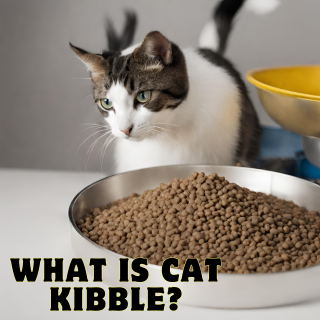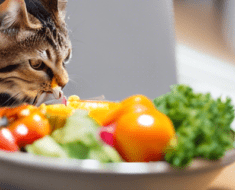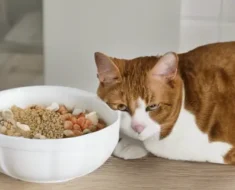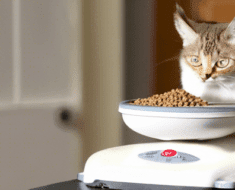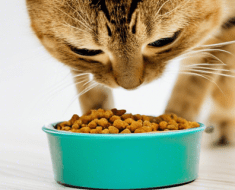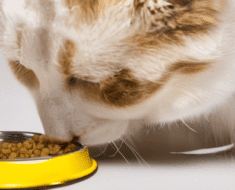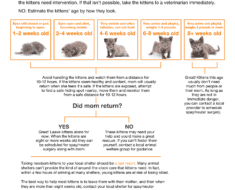Cat kibble is a dry, pelleted food designed specifically for cats. It is a popular and convenient choice for cat owners as it provides a balanced and nutritious diet for their pets in a convenient and easy-to-serve form.
Cats kibble typically consists of a combination of proteins, fats, carbohydrates, vitamins, and minerals to meet a cat’s dietary needs. It also helps to promote dental health by reducing tartar and plaque buildup. With a wide variety of flavors and formulas available, cats kibble offers options to cater to different cat ages, sizes, and dietary requirements.
Whether it’s for kittens, adult cats, or senior felines, cat kibble is a go-to food choice for many cat owners due to its convenience, affordability, and health benefits.
The History Of Cat Kibble
One of the most common types of cat food, cats kibble, has a rich history that dates back to early civilizations. From its humble beginnings to the diverse array of options available today, cats kibble has evolved to become a convenient and nutritious choice for cat owners.
Early Beginnings Of Cat Kibble
The origins of cats kibble can be traced back to ancient Egypt, where cats were worshipped and held in high esteem. Egyptians would feed their feline companions a combination of grains and meats, creating a rudimentary form of cats kibble. This early incarnation of cats kibble laid the foundation for the development of modern-day cat food.
Fast forward to the 19th century when commercial pet food production first began. Innovators like James Spratt and George H. Thompson recognized the need for a convenient and balanced dietary option for pets. They developed the first commercially available pet food, which included dry kibble for cats.
Evolution Of Cat Kibble Formulas
Over time, cats kibble formulas have undergone significant advancements to meet the nutritional needs of cats. With a better understanding of feline dietary requirements, manufacturers have incorporated a variety of ingredients to create balanced and nutritious cat -kibble.
Today, cat -kibble comes in various flavors and formulations to cater to different life stages, dietary preferences, and even specific health conditions. Manufacturers are continually researching and refining their formulas to provide cats with optimal nutrition.
Through the years, technological advancements in food processing and preservation have also played a role in improving the quality of cats kibble. Techniques such as extrusion and drying allow for the production of kibble that retains its shape, texture, and nutritional value.
Additionally, cats kibble now often includes added vitamins, minerals, and antioxidants to support overall health and boost the immune system. Many formulas also contain ingredients like real meat, poultry, or fish as the primary protein source, ensuring cats receive the essential nutrients they need.
In conclusion, the history of ca- kibble is a testament to the evolving relationship between humans and cats. From ancient Egypt to the present day, cats kibble has come a long way, providing cat owners with a convenient and nutritious food option for their beloved feline companions.
Key Ingredients In Cat Kibble
Discover the essential components found in cat- kibble, including high-quality protein sources, essential vitamins, minerals, and carbohydrates to support a balanced feline diet. These key ingredients ensure your cat receives the necessary nutrients for optimal health and well-being.
When it comes to nourishing our feline friends, cat- kibble stands out as a popular and convenient choice. This dry, crunchy food is designed to provide cats with a balanced and nutritious diet. Understanding the key ingredients in cat -kibble can help cat owners make informed choices when it comes to selecting the right food for their furry companions.
Proteins And Their Importance
Proteins are essential for cats as they support various bodily functions, including growth, maintenance, and repair. In cat -kibble, proteins are typically derived from animal sources such as chicken, turkey, fish, or beef. These proteins provide essential amino acids that cats cannot produce on their own. Amino acids are the building blocks of proteins and play a crucial role in maintaining the health and well-being of cats. Additionally, proteins help support healthy skin, a shiny coat, and a strong immune system.
Carbohydrates And Fiber For Cats
While cats are obligate carnivores, meaning they primarily require meat in their diet, carbohydrates and fiber can still be beneficial for their overall health. Carbohydrates provide cats with a valuable source of energy. In cat -kibble, carbohydrates are usually derived from ingredients like rice, corn, or potatoes. A balance of carbohydrates helps ensure that cats have the energy they need to be active and playful.
Fiber, on the other hand, aids in digestion and helps prevent common gastrointestinal issues like constipation. It also promotes healthy bowel movements. Cat- kibble often contains sources of fiber such as beet pulp, rice bran, or chicory root. The inclusion of carbohydrates and fiber in cat- kibble helps support the overall digestive health of our feline companions.
Essential Vitamins And Minerals
In addition to proteins and carbohydrates, cat -kibble is fortified with essential vitamins and minerals to ensure cats receive a complete and balanced diet. These vital nutrients, such as vitamin A, vitamin D, vitamin E, calcium, and phosphorus, support various functions in a cat’s body, including proper bone development, healthy vision, and a strong immune system.
The precise amounts and types of vitamins and minerals in cat- kibble can vary depending on the specific brand and formulation. Nonetheless, it is important for cat owners to choose cat -kibble that provides a sufficient amount of these essential nutrients to meet their cat’s individual nutritional requirements.
Overall, cat -kibble consists of key ingredients that provide the necessary proteins, carbohydrates, fiber, vitamins, and minerals for a cat’s health and well-being. By understanding these important components, cat owners can make informed choices to ensure their beloved pets are receiving optimal nutrition through their daily diet.
Choosing The Right Cat Kibble
Cats have unique dietary requirements that require specific nutrients for optimal health.
When choosing cats kibble, it’s vital to read and understand the information provided in the labels.
Benefits Of Cat Kibble
Cat kibble, also known as dry cat food, is a convenient and popular choice for feline nutrition. It offers various benefits that contribute to the overall well-being of your pet. In this post, we delve into the advantages of incorporating cat- kibble into your cat’s diet.
Convenience And Practicality
Kibble is easy to store, handle, and serve, making it a convenient option for busy pet owners. Its extended shelf life allows for bulk purchasing, reducing the frequency of trips to the store. It also eliminates the need for refrigeration, saving space in your kitchen.
Promoting Dental Health
Chewing dry kibble helps in the mechanical removal of plaque and tartar, promoting dental health in cats. The abrasive texture of kibble can aid in preventing the accumulation of harmful bacteria, contributing to the maintenance of your cat’s oral hygiene.
Potential Concerns With Cat Kibble
Cat kibble, while popular and convenient, has its potential concerns. It’s essential to be aware of these concerns to ensure your feline friend’s health and well-being. From common allergens to the impact of processing on nutrient levels, understanding these issues can help you make informed decisions regarding your cat’s diet.
Common Allergens In Kibble
Some cat kibble contains common allergens such as corn, soy, and wheat. These ingredients can trigger allergic reactions in cats, leading to skin irritations, digestive problems, and overall discomfort. It’s crucial to carefully review the ingredients list on kibble packaging to identify and avoid potential allergens that may adversely affect your cat’s health.
Impact Of Processing On Nutrient Levels
The processing of kibble can significantly affect nutrient levels. High-temperature processing methods used in the production of kibble can lead to the loss of essential nutrients, including vitamins and antioxidants. This can result in a less nutritionally balanced diet for your cat, potentially contributing to health issues over time. Consider exploring kibble options that employ gentler processing methods to preserve the nutritional integrity of the ingredients.
Frequently Asked Questions Of What Is Cat Kibble
Is Kibble The Same As Dry Cat Food?
Kibble and dry cat food are the same thing. They are food pellets that contain all the necessary nutrients for your cat’s health.
What Is Cat- Kibble Made Of?
Cat- kibble is made from a blend of ingredients including meat, fish, grains, and vegetables. It provides a balanced and complete diet for cats, satisfying their nutritional needs. This dry food option is convenient and helps maintain their oral health.
Should I Feed My Cat Kibble?
Yes, feeding your cat kibble can be a convenient option as it provides balanced nutrition. However, make sure to choose high-quality kibble to support your cat’s health and meet their dietary needs. Regular vet check-ups are recommended to assess your cat’s overall health.
Is Wet Food Or Kibble Better For Cats?
Both wet food and kibble have their benefits. Wet food provides more moisture and is closer to a cat’s natural diet. Kibble helps with dental health and is more convenient. A combination of both can provide a balanced diet for your cat’s overall health.
What Are The Benefits Of Feeding Cats Kibble?
Feeding cats kibble provides balanced nutrition, promotes dental health, and offers convenience for pet owners.
Conclusion
Cat- kibble is a vital choice for feline nutrition. Understanding its benefits can lead to a healthy kitty. Remember, quality matters when selecting the right kibble for your cat. Stay informed and provide the best for your furry friend’s well-being.
Keep your cat happy and healthy with the right kibble choice.
